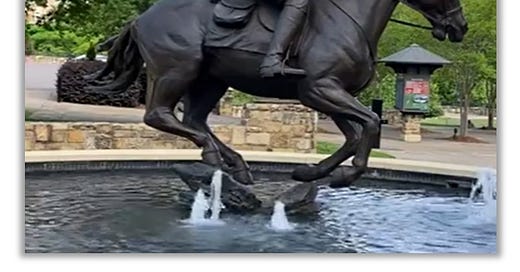At about this time in 1775, a Patriot begins a long horseback ride from Charlotte, North Carolina, to Philadelphia. The ride was long and exhausting—but urgent. The rider, Captain James Jack, has been called “Charlotte’s Paul Revere.”
One historical problem? To this day, no one is entirely sure what message Captain Jack carried. It’s said that he carried a document called the Mecklenburg Declaration of Independence, allegedly approved on May 20, but was there actually such a document? Or is the historical record muddled because of the Mecklenburg Resolves, adopted on May 31? Perhaps Captain Jack carried the Resolves instead.
Those Resolves suspended royal authority in Mecklenburg County and affirmed colonial authorities as the source of “all legislative and executive Powers.”
The citizens of Mecklenburg County had had enough: They were ready to be free from the British King!
Captain Jack was selected to carry the message to Philadelphia. North Carolina’s representatives in the Continental Congress needed to know.
The ride to Philadelphia was long and difficult, and the historical record is unclear on why Captain Jack was selected for such a challenging ride. He owned a tavern and might have been a merchant. Was he chosen because he had traveled the road before? Possibly. His own written account of events stated, simply, that he was “solicited to be the bearer of the proceedings to Congress.”
Either way, he needed to make the trip as quickly as he could—and he was putting his life on the line to do it. If he were caught, he’d be hanged for treason.
The weather wasn’t cooperating. Storms alternated with heat and humidity. Jack’s ride through such conditions, one historian concludes, was “long, lonesome and perilous.” He rode 550+ miles in these conditions, stopping here and there to let his horse rest. All in all, the trip probably took about two weeks. The exact timing is unknown, although there is a record of his return trip through central North Carolina in early July, so he was on his way back by then.
Likewise, his exact activities in Philadelphia are unknown. Jack himself documented his experiences quite simply: “I then proceeded on to Philadelphia, and delivered the Mecklenburg Declaration of Independence of of May, 1775, to Richard Caswell and William Hooper, the Delegates to Congress from the State of North Carolina.”
Did he speak with the delegates or merely deliver the papers? Contemporaneous records are again silent, although one historian about a century later claimed that Captain Jack spoke to the delegates, who then consulted with others in Congress. The next day, those delegates informed Captain Jack “that they had consulted with several members of Congress . . . and that all agreed, while they approved of the patriotic spirit of the Mecklenburg resolutions, it would be premature to lay them officially before the House, as they still entertained some hopes of reconciliation with England.”
The same historian claims that Captain Jack left with a flourish:
“Gentlemen, you may debate here about ‘reconciliations’ and memorialize your king, but, bear it in mind, Mecklenburg owes no allegiance to, and is separated from the crown of Great Britain forever.”
The description of Jack’s speech is likely a bit exaggerated. Having said that, it’s also worth noting that Mecklenburg County acted quickly and emphatically after the first shots of Revolution were fired. The spirit of his alleged speech surely rang true with many in Mecklenburg County during those days.
Reconciliation was not possible. The only way forward was full and complete American independence.
Sources can always be found on my website, here.





Been to the statue a few times. Live in town. Love the theme of this story. It doesn't matter if the facts all check out. Mecklenburg county was no longer part of the kingdom. Thanks Tara.
Thanks, Tara! I live in Charlotte, and this is a well-known, well-loved story here. Our international airport has a Captain Jack's Tavern in Concourse E, and here and there, you'll see references to him and his ride. He has become a legendary hero in the spirit of "We were the first to declare independence!"